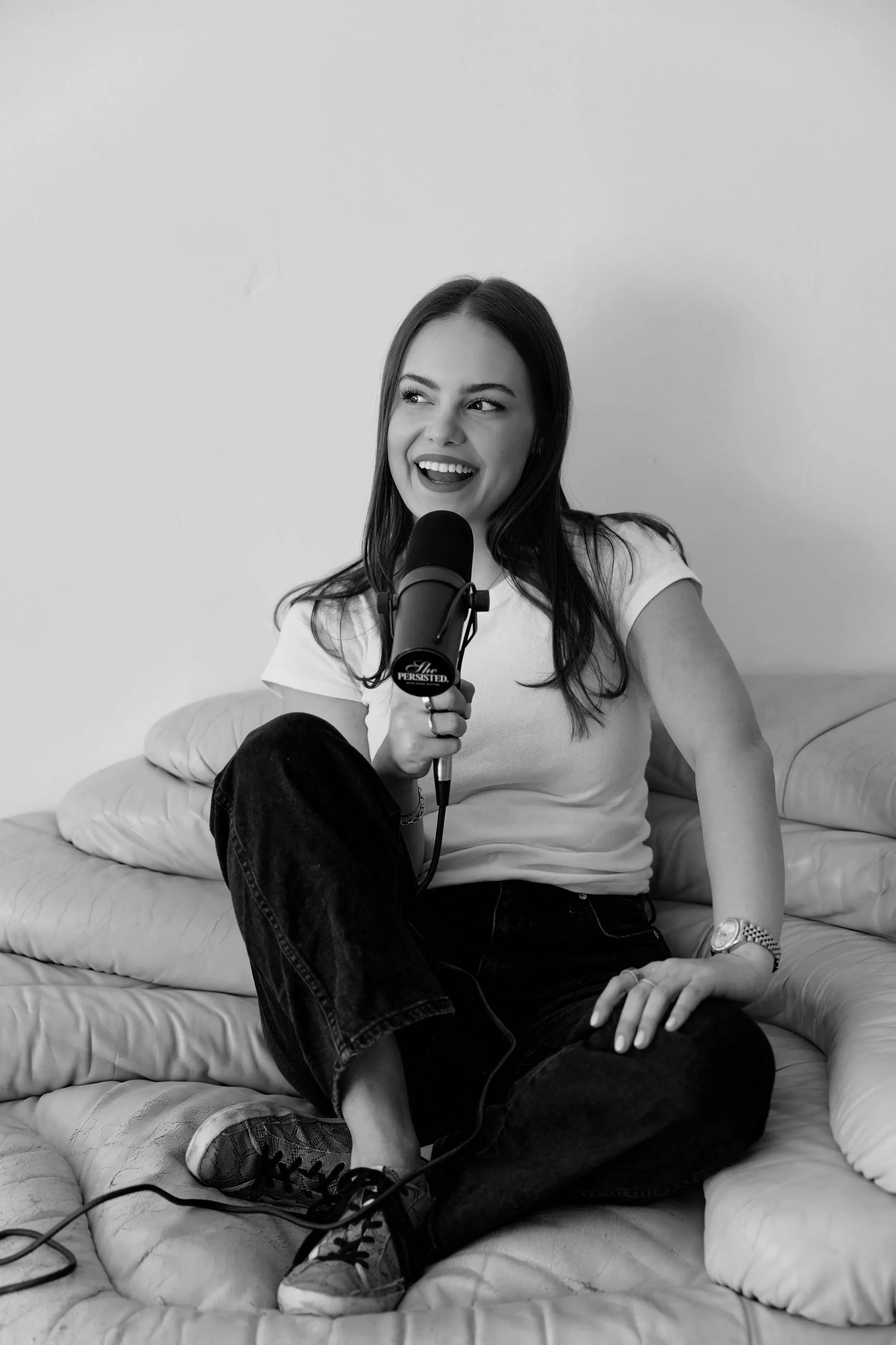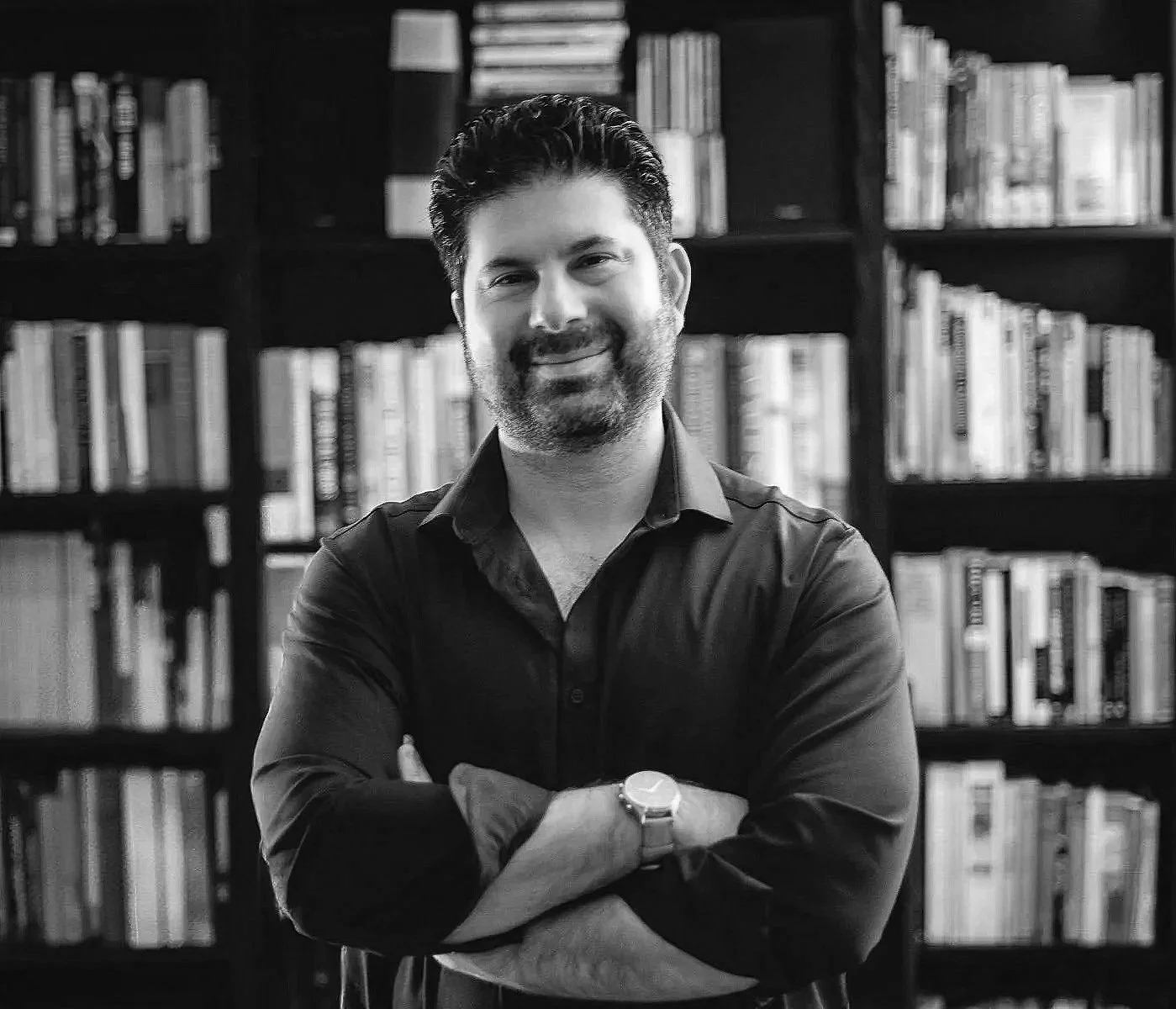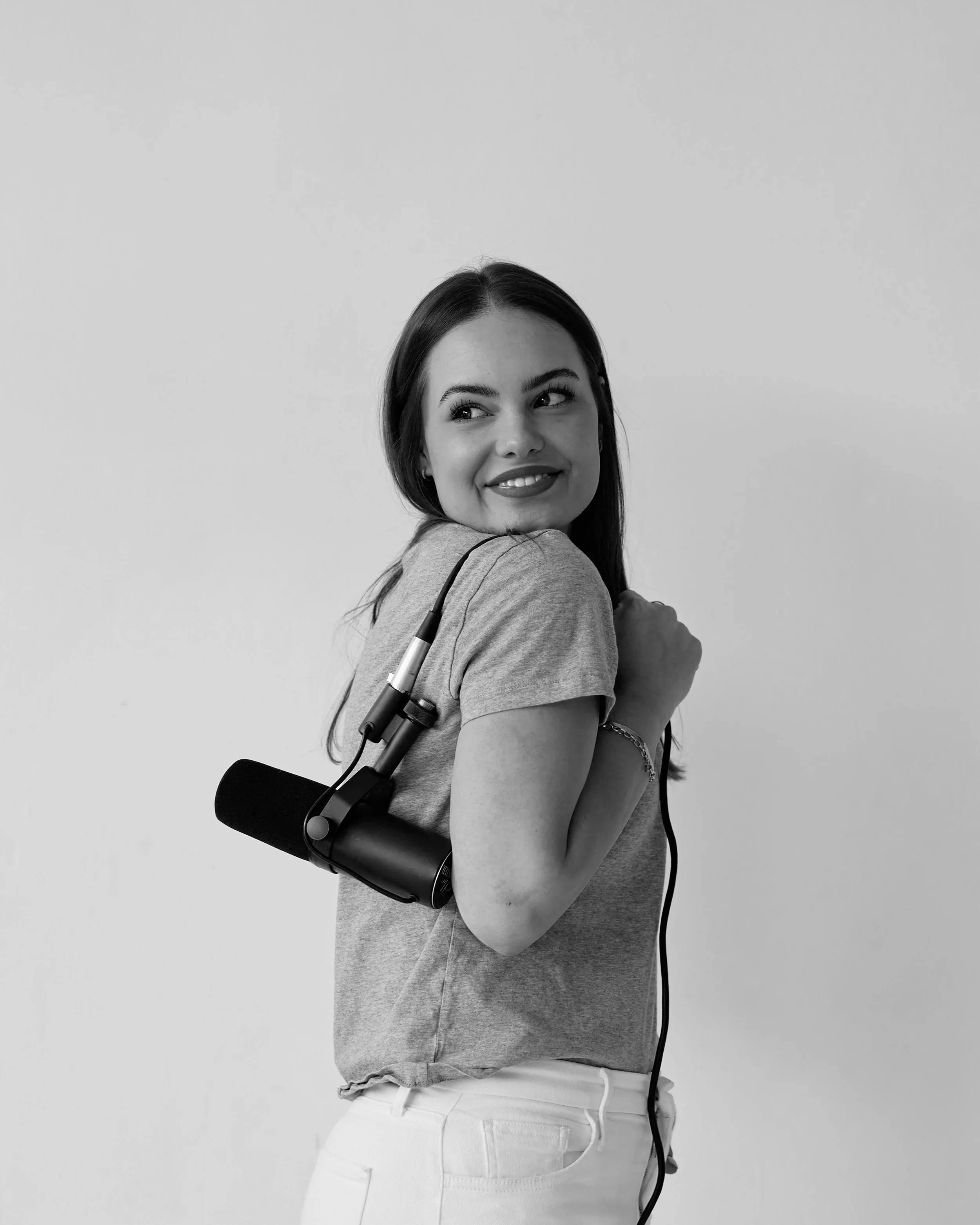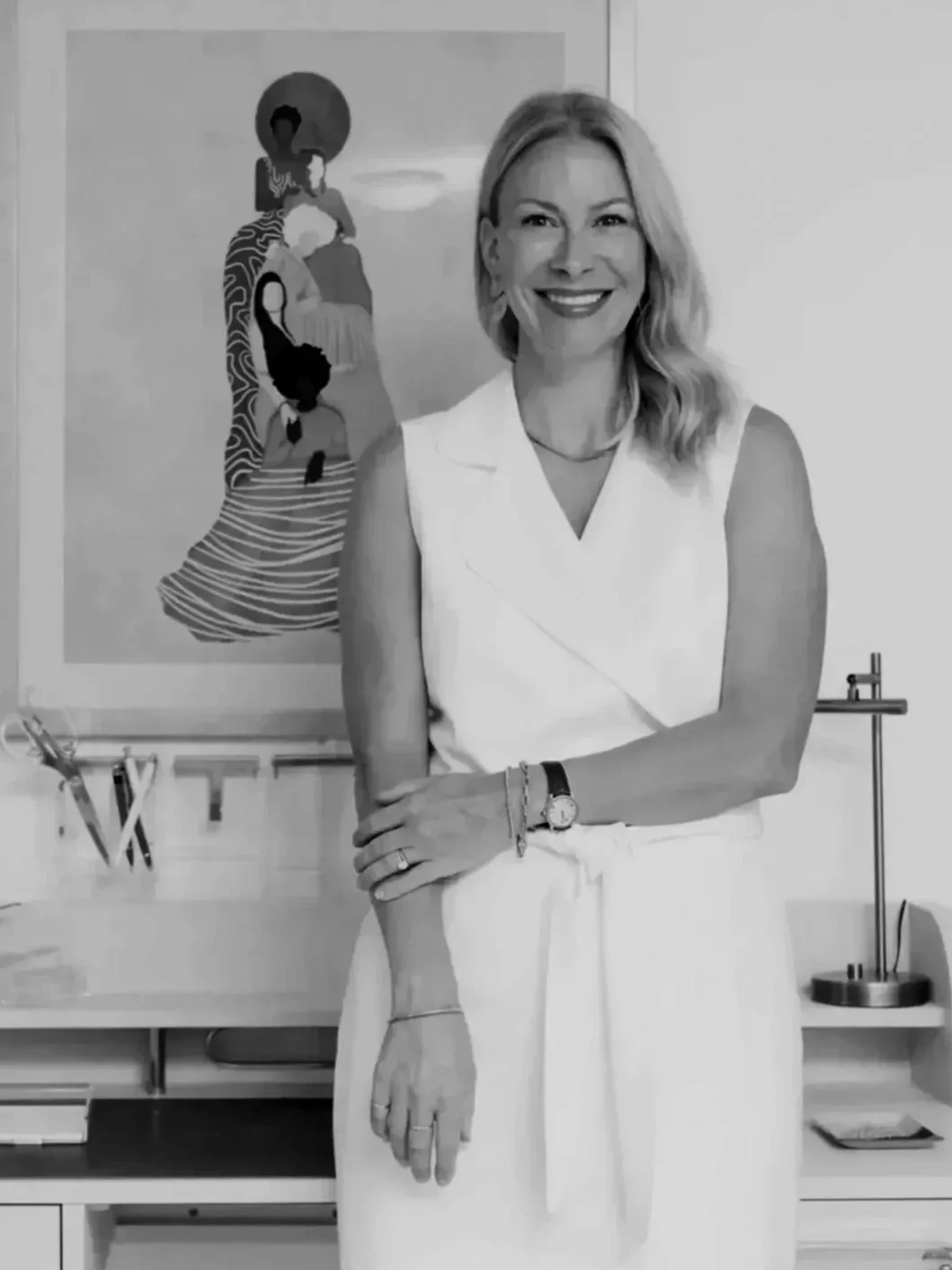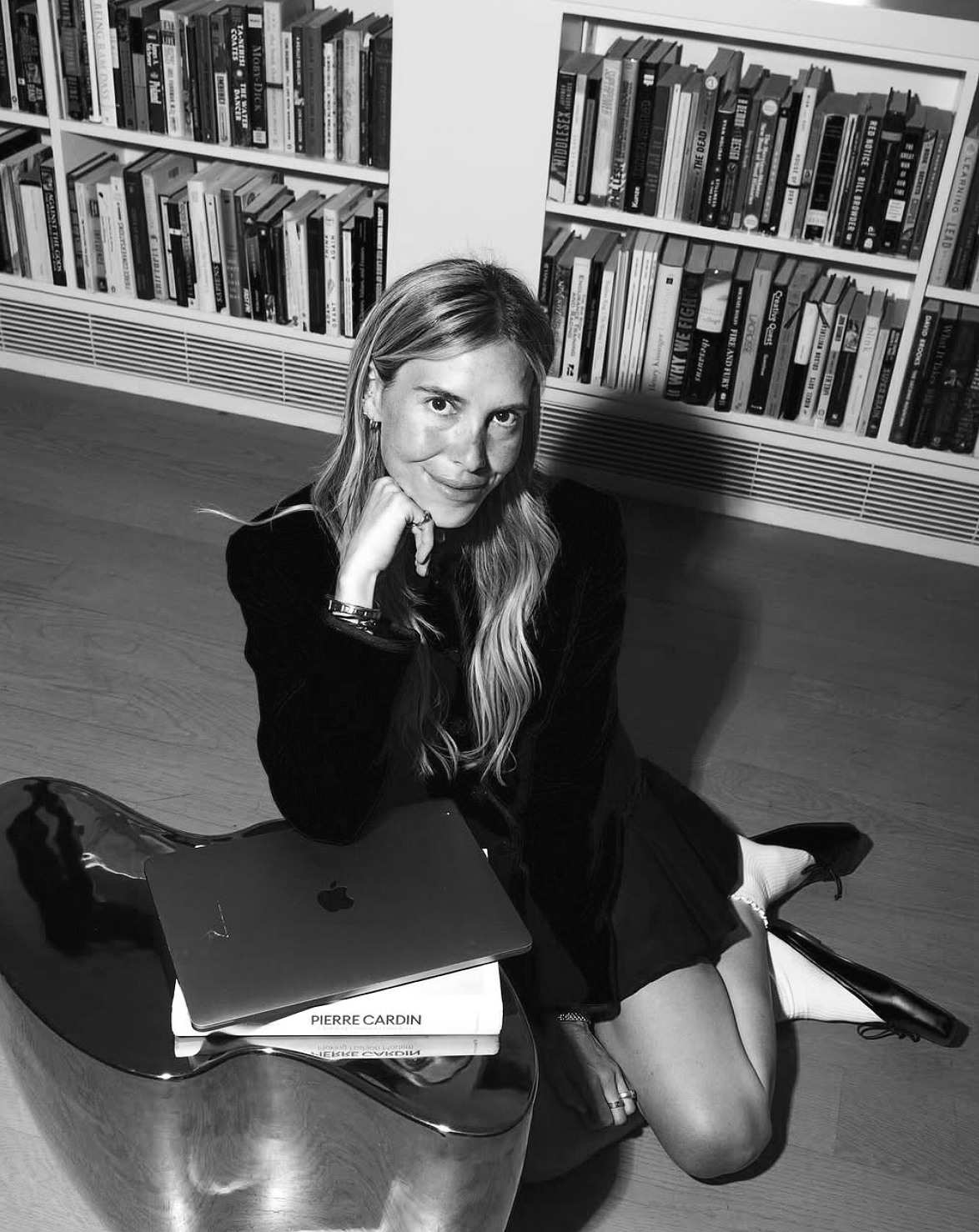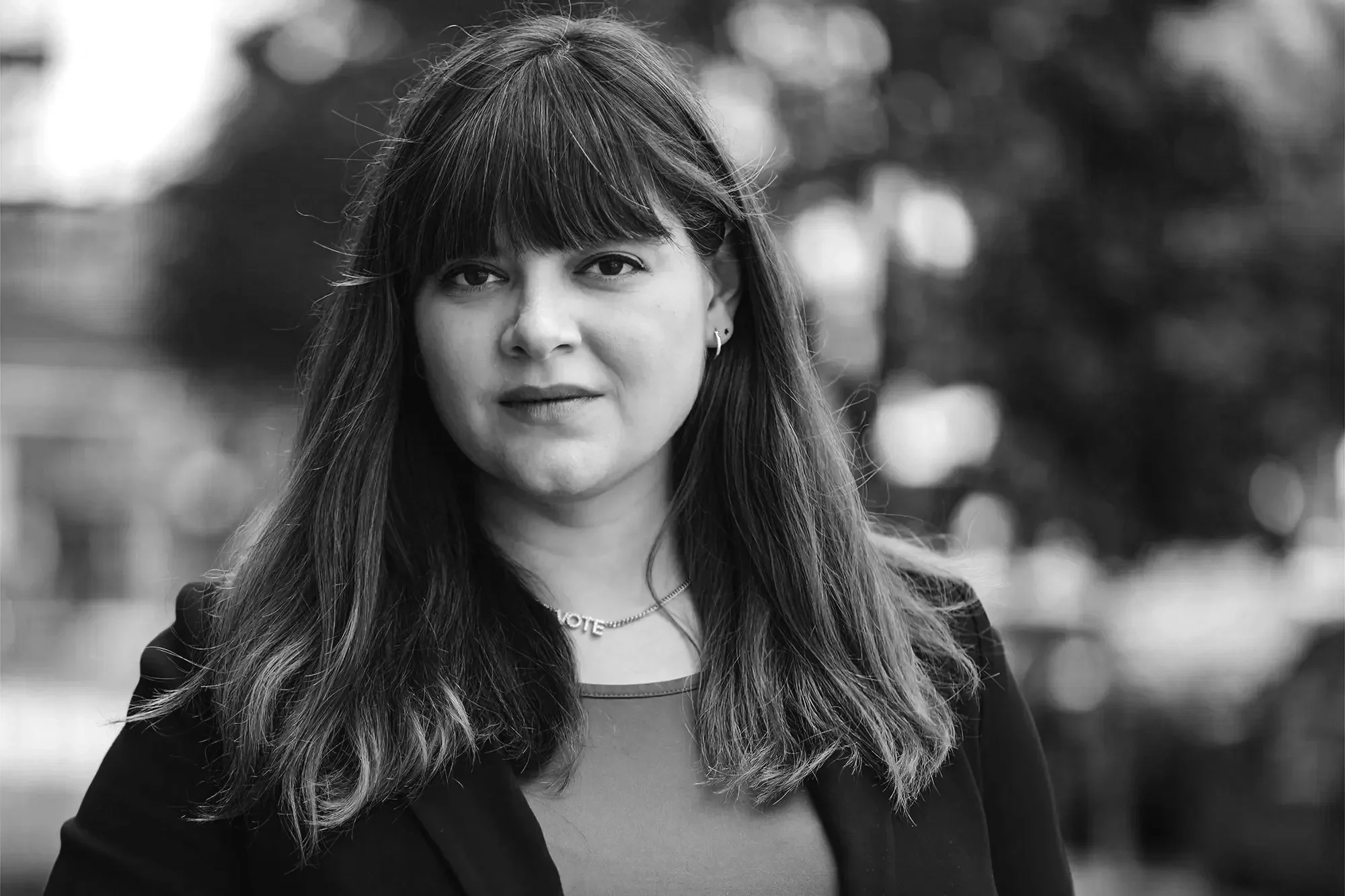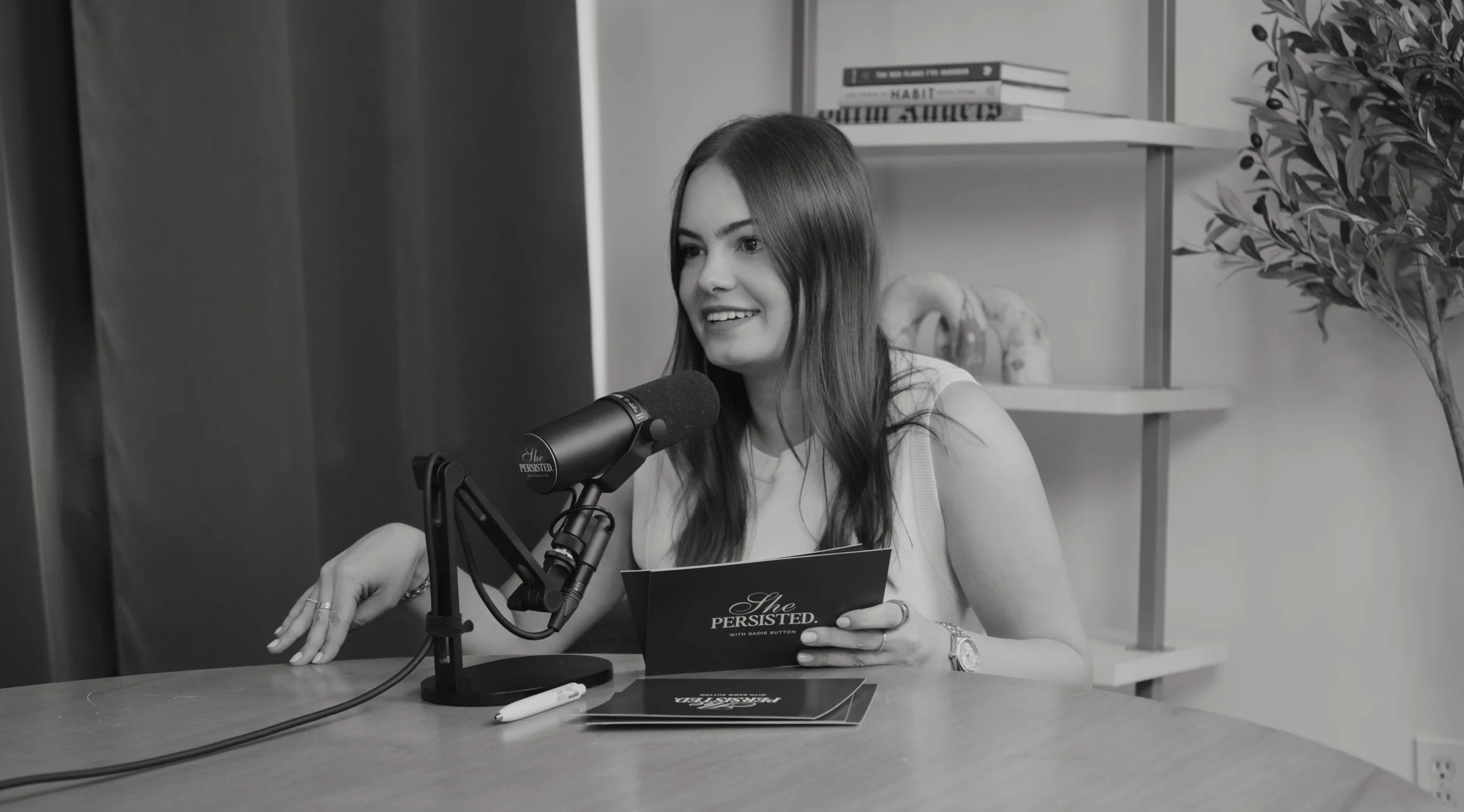28. Blaise Aguirre M.D. on Dialectical Behavioral Therapy, Emotional Experience, Persistence, and Taking Ownership of Your Life
Blaise Aguirre M.D. (world-renowned psychiatrist, dialectical behavioral therapy expert, founder and medical director of 3East, and assistant professor of psychiatry at Harvard Medical School) and I sit down to reminisce about my time at 3East, discuss the benefits of dialectical behavioral therapy, the importance of taking ownership of your life, and the complexity of emotional experiencing. If you have a teen in your life who struggles with mental health this episode is a MUST LISTEN.
More information about Blaise and his books can be found here...
> Mindfulness for borderline personality disorder: relieve your suffering using the core skill of dialectical behavior therapy (free as an audiobook)
> Coping with BPD: DBT and CBT skills to soothe the symptoms of borderline personality disorder
Keep up with Blaise on Instagram and Twitter!
About She Persisted (formerly, Nevertheless, She Persisted)
After a year and a half of intensive treatment for severe depression and anxiety, 18-year-old Sadie recounts her journey by interviewing family members, professionals, and fellow teens to offer self-improvement tips, DBT education, and personal experiences. She Persisted is the reminder that someone else has been there too and your inspiration to live your life worth living.
listen to this episode:
Tune in and subscribe on your favorite platform: Apple Podcasts | Spotify | Stitcher | Google Play | Radio Public | PocketCasts | Overcast | Breaker | Anchor
Sadie: This week. on Nevertheless, She Persisted…
Blaise: I often say to people, well, imagine that you had to have that bad day for the rest of your life. What would that be like?
Sadie: The way I taught myself how to manage those really strong emotions associated with my depression and anxiety, it was like bottling up.
Blaise: No child that I've ever met has ever said, 'I want this.'
Sadie: I'd never decided I wanted to get better because I didn't believe I could.
Blaise: Well, that's the thing is that you've gotten through the worst moments of your life, thousands of times, and here you are.
Sadie: Today I'm joined by Dr. Blaise Aguirre, someone I worked very closely with during my time at 3East. Dr Aguirre has been a staff psychiatrist at McLean hospital, the number one psychiatric hospital in the country, since 2002 and is nationally and internationally recognized for his extensive work in the treatment of mood and personality disorders in adolescents.
Dr. Aguirre Is also an assistant professor of psychiatry at Harvard Medical School. He has multiple publications, including Mindfulness for Borderline Personality Disorder: Relive Your Suffering and Use the Core Skill of Dialectical Behavioral Therapy and DBT and CBT: Skills to Soothe the Symptoms of Borderline Personality Disorder.
Links to learn more about Dr. Aguirre will be in today's episode notes.
Hi, thank you so fresh for coming on the podcast.
Blaise: I'm so happy to be on with you.
Sadie: So I wanted to start this episode the same way that we kind of first met and got to know each other, which was when I came to 3East and I was sitting in that room and you guys were like "why are you here?" And I was like, "well, my parents said that I had to, I can't stay at home anymore." And so that was like our first interaction. I'd kicked my parents out of the room. I was like, I don't want you guys here. And you said to me, you were like, "you can't do this. You can't be here unless you dive into the work for you and if you choose to get better." And so I wanted to kind of ask you. Why you believe that's so important?
Blaise: Yeah. So one of the things that I think is, and I've looked at my own life and just, you know, people around, and one of the things that I think of is like this to say, 'Hey, who wants to go and time a high mountain?'
And there was always a difference between like people who felt obligated to do something and people who wanted to do it, you know, something for themselves because the people who felt obligated would often like fall back and then say oh, you know, I don't want to do this. But the ones who wanted to do it for themselves would push on.
And the thing is, is that I, I've also found that so many people get told what they need to do and you'd like, you have to stop smoking weed or you have to stop drinking, or you have to stop seeing this person or whatever it is that other people seem to know our lives better than we do in this sense that they think that they know our lives and what we need to do.
But often we don't see that for ourselves. I mean, you know, saying like, I love running, but I say, okay, you need to exercise. I think you need to run. Well, maybe I do think you need to run, but maybe that's not the exercise you want to do. So unless you can find the wisdom in it for you, I just don't think it's helpful.
And allowing someone to make that decision for themselves is so much more helpful than being told what to do, and then if it doesn't work out and somebody told you to, say, well it's your fault. You know? So that's the way I see it. Yeah,
Sadie: yeah, yeah. No, I, when I think back to how pivotal it was when I chose to really work on my mental health for myself at McLean. And at 3East, I tried doing the full DBT program twice through, and I did all these outpatient programs at home and I met with all these people and nothing was ever changing. And I think, again, part of that was just needing the intensive, like residential environment. But before that point, I'd never chosen to work on myself.
I'd never decided I wanted to get better because I didn't believe I could. And so I agree completely that until I decided to get better for myself and saw the wisdom in it, that things didn't change.
So the next question I kinda wanted to ask you, I talk a lot on the podcast about DBT skills and how much they helped me. And so when I was there at 3East, I did a mix of the skills, education, individual family, and group therapy and medication management. For listeners, you're an expert in DBT. What are the benefits of dialectical behavioral therapy for adolescents and teenagers?
Blaise: Yeah. So, you know, as we go through life, we get, we learn how to do so many things. We learn how to walk, we learn how to feed ourselves, we learn how to write, we learn how to get onto a computer, we learn how to do podcasts. But, but the thing that we don't learn very well is how to manage our emotions.
Now, if you think about, you know, maybe you know thousands of years ago, and our ancestors were sitting in a cave, and the only thing that they had to worry about was whether they were going to be attacked by a saber tooth tiger. Well, they would learn how to manage that over time.
But I think that in this day and age, our lives have become so much more complicated. And so emotions are more complicated in the sense that the things that are coming at us, are so different. Relationships with with friends, with romantic partners, with parents, with ourselves, and you know.
Then the other thing is, is that there's all these messages from all around, maybe on the internet and maybe, you know, on TV about the way that we should be. So any kind of deviation from those kinds of, you know, norms or standards, you know, it can be confusing. And then you sort of think, well, am I crazy? Am I, am I just a different person? And so. So, so with all those other things, like walking or doing a podcast or whatever it is, like you can ask people, how do I do this? And then, you know, they can help you. But rarely do people say, how do I manage anger. How do I manage sadness? How do I manage upsetness?
And so I think, and I think it's more and more of a problem for young people in adolescents, because for a lot of people, they learn how to, some people might learn how to do that as children, but very few get taught how to do that. So I think that that's one thing that it's also something that you can learn.
Then the other, the other aspect of it is that. You know, many of our, many of us live lives where we're not very present, where either thinking about all the terrible things that are going to happen in the future or thinking about all the terrible things that have happened in the past, but we're not present cause right now things are, generally speaking, in this present moment, for most of us, not so bad. It's when we get caught up in, in, in all the beliefs of our mind, a lot of them false beliefs. And when we believe them to be true, that, that it's difficult. And so learning mindfulness skills is important, learning how to tolerate difficult moments, distress tolerance is important. So these are things that many people take for granted, but you can actually learn how to not only do but get better at them and apply them in different contexts.
Sadie: Yeah. I love what you said about how we don't really learn how to manage our emotions. And I, I think when I was younger and as I started experiencing these really strong emotions associated with my depression and anxiety. The way I taught myself how to manage those was like bottling up and ignoring them and not wanting to experience them. And because we don't have a way to learn how to properly function and effectively cope with those, a lot of the time people kind of deviate and end up in an unhealthy way of coping.
Blaise: Yeah. Well, I think it's a very good point. I think it's a very, very good point that what you said, because you bottle, you know, you can bottle them up. I mean, that is a way of coping. It's not a, it's not the best way of coping, but, but that is one. But the other thing is to say, if you were to say something like "oh, I'm feeling very angry." But then you look around and other people aren't feeling angry. Then you might say to yourself, 'well, am I abnormal?' You know, 'am I crazy for having these kinds of thoughts?' When often, you know, it's just the way that your brain experiences stuff. It's like if somebody is allergic to peanuts and they have a peanut allergy, but nobody else has it, their bodies have a reaction to whatever the peanut is that is different from other people. But that doesn't mean that they're crazy or you know, it's just how they're reacting and learning how to manage that is important.
Sadie: So we did touch on this a little bit, but one thing I wanted to kind of ask you about was kind of emotion education, because that's something that I know I never learned before I did DBT, which is kind of why we have emotions and what that experience is.
So once I learned what was going on and kind of accepted that and understood why the emotions that I felt were so big and so crazy, and I was having trouble managing them. So I kind of had three questions. The first one was why? Why do we experience emotions? Like why is that something as humans that we have.
Blaise: You know, if we think about, if we think about like the evolution of, of different capacities that you know, that animals had. So maybe, you know, lions had big teeth and it could, you know, either. Back or something like that, that that, that we as humans, we weren't that strong compared to other animals. We weren't as fast compared to other animals. And so the thing that had to keep us, make us strong is, is the group. But in order to have a group. I mean, if you're indifferent, if you're like an earthworm and you don't care about other earthworms, so then you just hang out in the soil by herself, but then you have to be underground otherwise a bird will get you.
If you're going to survive as a human being and you can't outrun your your threat, or you're not stronger than them, then you're going to have to be strong together as a collective. And it's very hard to be in connection with other people and in relations with other people too, without having emotions, the emotions of love and emotions of sadness and all of those sorts of things.
So, so, you know, emotions evolved to kind of keep us connected, but they also warned us they also evolved as an impetus for action, so that if your baby were being threatened, that you would not just allow some animal to eat, or if you're, and also sort of communicated to other people, like, you know, like you're crossing a line and this isn't making me happy.
And so it would be, you know, ways of signaling and communicating and communicating to ourselves, to other people as motivators for action. So, so there were important kind of neuro, a neurological it was a neurological evolution, I think in the brain that allowed for you know, as a way of communicating to the self and to the environmental what going on.
So, so that's probably what, how it, how it all happened.
Sadie: Yeah. The other question I kind of had, I did a research project like a couple months back where I was talking about how DBT can help us to regulate emotions more, and how when someone is experiencing depression and anxiety physiologically, like how they experience the emotions is differently.
So I was kind of wondering if you could explain what it's like for a normal, average human being who isn't experiencing depression, anxiety, what physiologically happens when they experienced, say sadness or happiness or anger, and then what happens when someone also has depression and anxiety? And how is that different? Why is it so much harder to cope when you're dealing with depression and anxiety and things like that?
Blaise: Yeah. So you, you know, you know, it's interesting cause I could spring out in new England and, and, and there's a lot of pollen in the air. And so, you know, I've got. I'm pretty, I'm very healthy, but I'm allergic to pollen. I just, I could make my eyes water and much more so than almost anyone. I know other people also have allergies to pollen. So, so if you think about like somebody having an allergy to pollen, maybe they're sniffling once or twice. They blow their nose and they're done. For me, my eyes, water all day, my nose runs and you know, I'm copying is sort of difficult to run.
And so, so it's, it's the degree of intensity, and that happens. So when someone gets sad, you know, maybe they lose a friend or the friend moves out of out of town, or they lose their pet animal or something like that and they get sad. There's a level of recognition that they have for that situation that says, yeah, this is a sad situation, and like, okay, I'm going to be able to deal with it.
But I think they were, for somebody who's got severe, severe depression and anxiety, the intensity, it's a little bit like with my allergies, it's just so intense and that, so that that period of time persists longer and persists more intensely. And I often say to people, okay, I mean, because even people who've never had mental illness, I've had some really, really bad days in their life say to them, well, imagine that you had to have that bad day for the rest of your life, what would that be like at that level of intensity? And for a lot of people, they sort of get it.
So I think it has to do with, with the level of intensity with which you feel that the duration of time with which you feel it, but also then the, the impact on things like sleep is that when you're very depressed, it's harder to sleep. You have thoughts racing through your mind. and a lot of them are, are negative thoughts, thoughts about maybe not even wanting to live and stuff like that. And then.
“You lose interest in things, you lose interest in relationships. You lose interest in friends, interest in eating. And so, so your body really begins to shut down and break down at very extreme levels.”
- Blaise Aguirre M.D.
But, but I don't think it's a different thing. I just think. I think it's just a much more severe and intense form of lasting a lot longer, but I think it's on a continuum so that some people experience it more mildly and othersyeah.
Yeah.
Sadie: That's something that I talk about a lot because. On the podcast.
I'm obviously talking to listeners who maybe don't experience extreme depression or extreme anxiety or something like that, but we're all feeling these emotions to sit different levels. And so the skills that I was able to learn in DBT, like my sleep and my eating and schedule, those that are just as helpful to me as someone who just wants a little bit more structure in their life.
So. You don't need some qualification to grow more and be able to improve because we all are experiencing the same things just at different levels.
Blaise: Yep. Yeah.
Sadie: So another question I had kind of about DBT is that, how can listeners kind of... if they want more support with DBT, what's your advice for finding providers and resources near you? Cause that was something that I know my family and I had a big, a lot of difficulty with when I started experiencing pretty severe depression and anxiety.
Blaise: Well. You know, there's, there's different kinds of therapies. There's there, there so-called talk therapies where people go in and just spend a lot of time talking about the things that have happened to them. Some people find benefit in those kinds of therapies.
“What I found is that for people who are really struggling with very negative thoughts and a lot of depression, is that simply talking didn't seem to change things."
- Blaise Aguirre M.D.
Maybe they felt understood more. And so, so that the behavior therapies, like dialectical behavior therapy seemed to be kind of more effective.
So, so, you know, if you, if you, if you look around, there's lots of therapists actually, but then the question is how do you find a DBT therapist? DBT also has, has had a rub against it in the sense that. Because when Linehan developed DBT, she did a lot of mindfulness practice and meditation. A lot of people, you know, sort of thought that that was very cultish in the sense that they thought of, okay, what are you saying? That you have to be like a Buddhist monk and, and you know, believe in all these things. And it seemed a little bit kind of different from traditional therapy. So, so there, at first, there was a kind of the, the broader psychotherapeutic community kind of looked down on it and that.
And the other problem is, is that one thing is that you see that. For a lot of therapists is that they, some therapists found it interesting. But then when you're working with people who are very, very depressed and maybe even suicidal day in and day out, they said, wow, this is really interesting. But I just don't think that I can bear the sorrow of living with people who are so depressed all the time.
Sadie: Make a big emotional risk to take, for sure.
Blaise: Right, right. So, so, so the thing is, is that you know, every year more and more people are learning DBT and are doing DBT, but still as a percentage of the total amount of therapists out there, it's still a very, very small percentage. And you know, for me, one of the things in terms of education is teaching therapists that even if they're going to do a lot of their traditional therapy, that knowing how to do DBT is going to be helpful to you because it's going to help you when your clients are maybe struggling in a certain way.
So back to the, the question, the problem is, is that there are also some people who say that they've done DBT, but they went to a class or two and then learned one or two things, and then they think that's the DBT, so, so it's, it's, it's a hard, it is a hard, I mean, sadly it is a hard thing because finding a qualified DBT therapist in the community, if they're good, they're often full.
So you know, to the extent that anybody can persist and even maybe put themselves on a waiting list. Now when you're setting of mental illness, being on a waiting list is like a terrible thing because you have to wait for the long and it's, and it's, it's painful when you're suffering, so it is hard. I just want to recognize that.
And it's definitely easier to a certain extent, if you're in a bigger metropolitan area. So like in. You know, the West coast and the East coast where there were bigger cities and many people in the middle of the country don't have that many people.
Sadie: There's just not the resources.
Blaise: Yeah. They just, they just aren't there. And then the good ones, the good therapists are often full. So, so, but I wouldn't give up hope as a, as a patient, because if you've got other kinds of therapists, I've had clients who've sort of taken their DBT workbooks and said to the therapist, we're going to learn this together. I'm going to teach you how to do DBT so you can help them.
Sadie: I love that.
Blaise: Yeah. So, so, so, so I think, you know, the other thing is, is that DBT isn't something that you need to do forever. That glue, there's other forms of vary, but it's to get you through those crisis moments. A lot of it once you learn to do it you just do you just do it by yourself, but it is difficult to find a qualified DBT therapist for a lot of people.
I just want to recognize that.
Sadie: Yeah. So when you were talking about why it's, there's such a lack of DBT therapists, you mentioned that it's very hard for people to fathom the idea of working with a patient who's really at risk and is suffering a lot, and you don't really know how that's going to pan out.
I know what I came to you guys. I firmly, firmly, firmly believed that I was not going to be happy. Nothing was ever going to change. I was like, anyone else can do it. Like I get, I get that other people are happy and they can get better, but I was like, it's not happening for me. I just can't do it. And so I now know that's not the case.
Like I, I moved past that and I like, I know that just believe that wasn't true. And so. I'm wondering if you've ever like at 3East or wherever, have you ever come in contact with the patient where you're like, it's just not, nothing's going to change and not because they didn't want to or because they didn't believe it would work, but have you ever met someone where you really were like, nope, there's going to be unhappy forever. It's out of their control no matter what they do. This is just what they'll have to deal with.
Blaise: It's a, it's a tough question to answer because my own nature is very optimistic. I really believe in the wisdom of every human being. I really believe in the capacity to, to experience joy and to sort of remove the delusion of false heard from, from their experience.
And what I mean by that is, is that. You know, to, to get caught up in a belief system that says, this is never, ever going to, this is never going to change. And I'll tell you why. I don't believe that this is never going to change because you know, because life is impermanent. We know that life is impermanent every moment.
Like, I haven't seen you for a long time, but now I'm seeing you. So there was impermanent. So there was a change from what was to what is now and impermanent is on your side. Impermanence will help you. Now I, I have met people who've, who are very scared of change or who have told me that they're scared of getting better, who feel that they need more resources around them to be able to protect them from themselves.
But even those people have seen, have little moments of, of joy. So I bet there, I think that. There's also a question of readiness in the sense of, you know depending on the person's circumstances, maybe they're living in fear. Maybe they're living in a very toxic environment that threatens them a lot, that they, at least the suffering that they have is the suffering that they know and
Sadie: and it's comfortable.
Blaise: They're uncertain.
Yeah, exactly. Exactly. So, so, so. Rather live with that. But, but I've, I've definitely had people who, who agreed, like they would, you know, like they say like, I'm never going to be 18 years old ever. And then all of a sudden they get to 18 and they think, what am I going to do with the rest of my life?
Because like, I never thought I'd get beyond this. So, so, so I, I've definitely met a very, very small percentage of people who, who've really been stuck and very afraid and sort of continued to suffer. And I think it's also true. Like I don't, you know, I mean, there's some people who have say depression, but then they've got maybe physical illness.
I mean, we've met people who've had depression and then they've recovered from cancer and they've had, you know, chronic childhood illnesses, you know, severe arthritis and split from pain syndromes and everything. And those are very, you know, like when you, when you just get bombarded with all of these things, there's abuse in the home and it can feel as if it will never change and it can feel that if there is change, it's a very slow rate of change. But, but I think it's rare, on the whole, I really believe in people, and they're going to teach you find wisdom, so yeah.
Sadie: So this next one is a little bit broad, but I think when I was talking to my parents and thinking about what I wanted to ask you, it seemed like something I had to ask, which is, what advice do you have for parents that have a teenager or a child that's struggling with depression or anxiety or some mental health issue?
Blaise: Yeah. Well, the first thing I would say is I would tell parents is that no child that I've ever met has ever said, I want this. And no child that I've ever met has said that I've met. I mean, maybe there are other people out there, but never said, Oh, like, it's a nice Tuesday morning... I'm gonna make my parents' lives miserable today. So I think that that's my goal for the day.
So if we could move away from thinking that this is personalizing it from thinking, Oh, someone is intentionally doing this to me, the child is already often suffering and that kind of attitude can make them suffer even more so, so, so I think it's,
“It's not asking the question, what the hell is wrong with that child, but asking what happened?”
- Blaise Aguirre M.D.
How did you know if we believe that everything is caused and everything is caused, it's caused by the things that lead up to that, that thing is that something caused the suffering. And I think rather than trying to figure it out and judging it it's just to be able to listen and just accept that that is the situation at at, at the moment. Because it's, it means that it means that there can be a curiosity that can be an acceptance of the child and you can just, you can love a child just so much more that way rather than, because if I think my child is suffering, if I see my child's broken their leg and they say, Oh, they're suffering, and I say, Oh my gosh, they've broken their leg, they're suffering.
Because then that helps the child. So if you can do that
Sadie: validation.
Blaise: Yeah. So that's right. It's a recognition that there's truth in what the person is experiencing, but I think that that parents, either because of fear, they don't know what to do with. Often blame the child, 'Hey, stop being lazy. Get out of bed. You've got everything in the world. Why do you, you know, like, what more could you need from us?' And all of that sort of stuff. So that that's, it would be a, you know, sort of a validation of curiosity as slowing down and not attacking it. Just being, you know, just accepting that this is, I know it's hard, but it often gets to it will often get to healing much quicker than, than simply attacking.
Sadie: Yeah. I know my mom struggled with that for a long time because she was like, I just want her to like get in the car and go somewhere, and then she'd be like, how? How is it helping? If I'm like, yes, I see you're in pain, and yes suffering because a lot of the time it's just like, how can I get out of this little mini crisis? How can I keep moving? And then not just look at the big picture.
But now my dad and I will laugh when he's like, I really tried to like play classical music as loud as possible to get you out of bed. And I don't know why I thought that would work, but he just didn't know. He didn't understand it. And it took that curiosity and asking those questions and then that acknowledgement and growth together for him to understand and for us to all move past that.
But yeah. And so if that's what you tell parents, what would you tell teenagers or anyone that's suffering from mental illness?
Blaise: Well, I think a few things. One is I want them to let me know about what it is that they're experiencing and suffering. And so like, I think too many professionals, like somebody comes in and says, Oh, I'm depressed and say, okay, well you're depressed here, take this pill.
Like I'm going to be telling you what, what you need, but, but I really believe that I have to, it has to come from within you. Like this is my experience. So, so that I am not going to judge. I'm just going to listen. I'm going to understand to the extent that I can, I'm going to hear you out and ask you what it is that you want to change.
How it is that you want to live your life, and if what you're doing. Right now is this is changing your state of suffering, and if it isn't changing your state of suffering, maybe you can do something else. Now, I don't know that the thing that you're going to do is going to make things better. Maybe it does or maybe it doesn't, but it's going to be different.
You know, the whole saying of insanity, doing the same thing over and over again and expect a result. And it's like saying, okay, but you're stuck in this loop of suffering. You can do something different. So, but that, that, but, but I have to work with them to put it to, to say, you have to want to change this and I will work with you to, to want to change it but
“You've also got the freedom to not want to change this.”
- Blaise Aguirre M.D.
Yeah. And trying to force you to change something that you, at this point in time, don't want to change. Doesn't make any sense to me. So, so I will be here, but I will be here. So when you go home, and I don't think that things are gonna change, but when you go home and they don't. If you want to call me up and in a months time, I'm still going to be here. That's what I say.
Sadie: Yeah, no, I love that. So I have two more questions. One is what we used to do when everyone did their goodbyes from intensive, which is what's your favorite DBT scale and why?
Blaise: Yeah. So I, you know, I mean, I know that people tease me a lot to actually, I just opened up an Instagram account and so I have no idea my, my own children laugh at me because they say, I don't know how to use Instagram, but somebody,
Sadie: my mom too, she's so bad at all that.
Blaise: So, so the, so there was somebody who posted a meme about like what it looks like when I am doing mindfulness. So I love mindfulness. I think it's, it's the skill that I dunno, keeps me most grounded. most present, most connected, most true, most authentic. And yeah. So that's, that's the one I use the most.
And then probably opposite action. So opposite action is that. When I'm feeling miserable and I'm doing something that's keeping me miserable, I do. So, I actually it a different direction just because I, you know, what's the opposite of lying in bed is sitting in a chair opposite to lying in bed, running around the opposite, you know? So I just think it's different action from what you do. So those are my two favorites.
Sadie: Not rolling over and sleeping on the other side of the bed but something a little bit different.
Blaise: Yeah, right. Exactly. Exactly. That's it. That's good. That's a nice example, right? Because that would be actually the mirror opposite of that. Yeah. Actually, I might even use that.
Sadie: Yeah.
Blaise: Okay,
Sadie: so the last one is pretty vague, but what do you want to get out here? Like on this podcast? What do you want people to take away from you and just know from. Your expertise in your opinion?
Blaise: Well, you know what I want them to take is I wish that they knew you when you, when, when I first knew you, and I wish this
Sadie: I was such a mess.
Blaise: I wish that they could see you because, because, because each and every day when I see stories of success, of improvement, of like taking your life and owning it. It just brings me joy beyond anything. And so that's what I want them. It's, I, you know, like they can't know you what you were like then, that, you know, you can tell this story, but, but, but you, that's, I think that, you know, you're the exclamation point at the end of this podcast.
Sadie: Yeah, no, I. That's kind of why I started it, because I again, was the firmest believer that nothing would ever change for me. And I, I just didn't believe it. I didn't think it was possible. And I, I, when I got to the point where I was like, wait, this is what everyone's talking about, where you've experienced joy and you look forward to things and you have people around you that you love. And I was like, I got to tell someone about this. Because if I, the first thing that like had no faith that this would happen, if it happened to me, then anyone can do it.
Blaise: yeah. That's wonderful. The path is never going to be a, a smooth all the time. It will be bumpy, but at least they're your bumps and that their bumps that you know how to manage when the grumpiness sets in whenever it is next.
Sadie: and I think that was like something that was crazy for me when I would feel depressed, because I would immediately go into, Oh no, I don't know what to do. Like, this is awful. Like this. That was like, wait, but I got through this. I know how to do this again,
“The thing is you've gotten through the worst moments of your life thousands of times and here you are.”
- Blaise Aguirre M.D.
Sadie: Yeah, and it was the same thing when Quarantine started because I was like staying inside all the time, like this is the worst thing I could do for myself. And I was like, wait, I did this. Like I, I stayed at residential and I stayed in the hospital and I've done this before. I know how to cope and do this and still be happy. So yeah, exactly. I was like, I have the perfect special skillset for this quarantine and shelter in place. I've done it.
Well, thank you so much for coming on and answering my questions.
Blaise: Yeah, no, of course.
Sadie: If you enjoyed this week's episode of Nevertheless, She Persisted please leave a review on Apple podcasts and share with your friends and family. To stay updated on new episodes dropping and bonus content follow Nevertheless, She Persisted on social media.
© 2020 She Persisted LLC. This podcast is copyrighted subject matter owned by She Persisted LLC and She Persisted LLC reserves all rights in and to the podcast. Any use without She Persisted LLC’s express prior written consent is prohibited.






